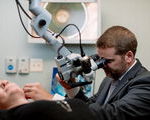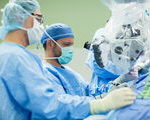Teacher of the Year award for Matthew Carlson, M.D. — pursuing projects that enrich residency
Matthew Carlson, M.D. (ENT ’12), Department of Otolaryngology & Audiology at Mayo Clinic in Rochester, is popular with residents in part because he has focused energy on things that matter to them and enrich their training. He’s developing a large surgical video library for the department and recently secured funding for and redesigned the resident temporal bone and skull base dissection lab — now a state-of-the-art facility where residents can practice on cadavers and simulate real surgery to improve surgical proficiency and safety. Within the last two years, he worked on establishing a fellowship in otology/neurotology at Mayo Clinic that recently received ACGME accreditation.
He also has initiated three annual hands-on residency training conferences in otology: “Otofest,” a two-day general ear surgery course; “The CI Workship,” a two-day conference focused on cochlear implant surgery; and “The Midwest Skull Base Conference,” a three-day course focused on lateral skull base surgery.
And, for the last three years, he has taken groups of residents to the Boundary Waters for team building and to enjoy the natural beauty in northern Minnesota. The group canoes in and portages over three days. This year they’re mixing it up and visiting Voyageurs National Park, also in northern Minnesota, for some world-class fishing.
Dr. Carlson says he naturally gravitates toward educational projects. “I get energy back from these things that make our ENT training program more robust. Knowing our residents nominated me for this award makes it the coolest award I could ever receive at Mayo Clinic.”
 What’s your teaching style?
What’s your teaching style?
I like the residents to have a hands-on experience with graduated autonomy. It is one thing to read about it and observe a case, but it’s a whole other thing to do it yourself. The more they can do under appropriate supervision, the faster they will learn and grow.
With our developing resources, before residents perform a procedure they can read about it in our surgical case description library, watch a surgical video from the video atlas series multiple times and go to the temporal bone dissection lab to practice. Then, they perform the procedure and, afterward, write down the steps of the case. It’s essential that we provide quality tools that allow this valuable repetition.
What’s rewarding about teaching?
 I often have second- and third-year residents on my service. Under the apprenticeship model of our residency program, I have the same residents for several months and can teach them each progressive step day after day. If they’re doing well, I allow them to progress to the more complex steps. They’re often able to perform upper-level cases relatively early in their training that their peers at other institutions usually do not get exposed to. This builds residents’ confidence and validates their hard work. I love seeing them succeed at more difficult cases, even early in their residency training.
I often have second- and third-year residents on my service. Under the apprenticeship model of our residency program, I have the same residents for several months and can teach them each progressive step day after day. If they’re doing well, I allow them to progress to the more complex steps. They’re often able to perform upper-level cases relatively early in their training that their peers at other institutions usually do not get exposed to. This builds residents’ confidence and validates their hard work. I love seeing them succeed at more difficult cases, even early in their residency training.
I also actively mentor residents in research. These residents often present their work at national and international meetings and publish in well-respected specialty journals. Working with them to develop a research question, devise a plan, carry out the project, analyze and interpret the data, and package the project into a succinct presentation or paper is very fulfilling to me.
How do you know when you’ve done a good job teaching?
A good educator supports growth in all areas relevant to patient care and career development. This includes clinical acumen, surgical skill, patient interaction, assimilation of clinical research into practice, carrying out basic science or clinical research, and becoming a mentor and educator themselves for the next generation. My primary goal is to help residents become the best surgeon-scientist-educator they can be. The more proficient, efficient and safe they are, the better job I’ve done. My success is most immediately measured by how well residents progress through their quarter with me, how proficient they are at ear surgery and what they can do in a case.
How do you handle it when trainees struggle?
Each resident comes in with unique skills and areas for growth. Everyone struggles with different things and grows at different rates. Some residents need more help with refining technical skills or improving fine motor dexterity. Others struggle with time management, clinical or surgical efficiency, prioritization of tasks or organizational skills. Others may excel in such areas but struggle with challenging patient interactions or working within a team. I do my best to assess their unique strengths and identify areas that need work and help them grow.
Working with different residents each quarter forces me to develop and understand new ways to explain information or concepts. With each resident, I realize how different we all are. A good educator is flexible and adapts to the learner’s needs.
Who are your teaching role models?
C. Weldon Jones, Ph.D. (deceased), was an undergraduate professor at Bethel University who inspired me. I had planned a career in field biology, possibly for the Department of Natural Resources. He engaged me in molecular and cellular biology, which changed my career path.
At Mayo Clinic, Michael Link, M.D.(MED ’90, NS ’96), Department of Neurologic Surgery; and Colin Driscoll, M.D. (ENT ’97), chair of the Department of Otorhinolaryngology – Head and Neck Surgery, have been teaching role models.
During fellowship training, David S. Haynes, M.D., and George Wanna, M.D. (both at Vanderbilt University), were very influential to me as I started my career in neurotology. I still talk with them weekly.
What does the Teacher of the Year Award mean to you?
Many people in our department could have received this award. And there are several that have received this award numerous times.
This is without doubt the best and most meaningful award I will ever receive at Mayo Clinic because I was nominated by our residents, not selected because someone reviewed my CV.
Student comments
“Dr. Carlson exemplifies the teaching surgeon. He helps us define goals, such as performing a solo cochlear implant by the end of the rotation. The goals are lofty but realistic, and they inspire us to learn, invest, know and improve through the rotation.”
“He keeps us safe while pushing us to be the best operative second-year residents in the country. And he allows us to enjoy it. He fosters a fun work environment.”
“Dr. Carlson does some very precise, high-stress surgeries but has been amazing at letting residents operate with increasing autonomy as they spend more time with him.”
“Dr. Carlson constantly takes steps to make our program better. He singlehandedly got the funding for and designed our new temporal bone lab, enabling PGY-2s early exposure to otology.”
“His enthusiasm is contagious! Dr. Carlson has been a tremendous addition to the staff, and I feel really lucky to have had him as a mentor for the past few years.”